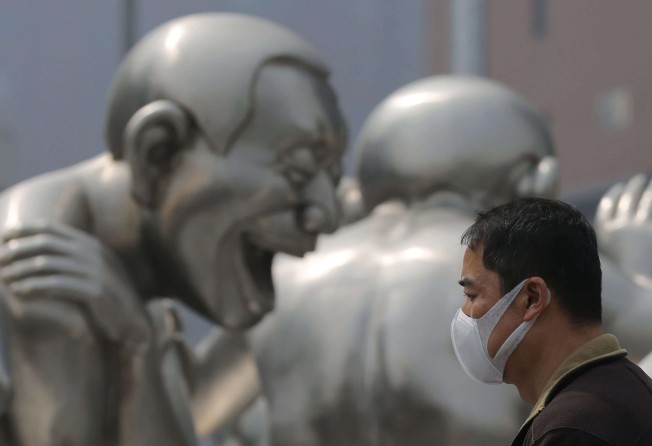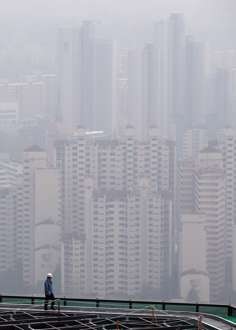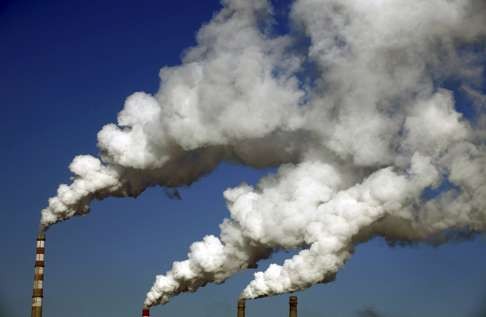Our air quality won’t improve until this one thing happens
Cleaning up air pollution will require ‘relentless pressure’ on leaders in Hong Kong and the Pearl River Delta

A close mainland friend told me recently about his 21-year-old niece in Nanchang. Newly married, and seven months pregnant, she suddenly fell seriously ill. Perplexed doctors quickly discovered she had advanced stage liver cancer. She died before her baby was born, and the baby survived just a few days.
This appalling story provided the starkest of reminders of the undiscussed burden of China’s pervasive pollution. Except in the rarest of cases, people aged 21 should not get liver cancer. This comes as a result of years of overwork and wear and tear on your liver – often by drinking too much hard alcohol, but also as a result of someone suffering unrelenting assault from contaminated food and drink. Such deaths are common on the mainland and are a dreadful reminder of the invisible price paid for the industrial pollution that engulfs most of its cities. Being “manufacturer to the world” carries heavy and tragic costs.
A new study from the World Bank brings this awful reality into sharp focus. Focusing only on air pollution – mainly the microscopic particles of carbon, sulphates, nitrates and heavy metals that are pumped out by road vehicles, power stations in city communities, and by cooking fuels like coal, wood and dung in poor rural societies – the World Bank has concluded that one in 10 deaths worldwide are attributable to air pollution exposure – that is more than 5.5 million premature deaths due to pollution, out of an annual total of around 55 million deaths worldwide. That is six times more deaths than from malaria, and four times more than HIV/Aids. Of these premature deaths, over 1.7 million are in China, and over 1.5 million in India.
Most sobering of all, the welfare losses due to ambient and household air pollution cost our economies more than US$5.1 trillion in 2013. Foregone income from these premature deaths cost the global economy US$225 billion.

Around 70 per cent of the health-ruining pollution is accounted for in East Asia and South Asia, with the worst concentrations in north India and in north and central China, but no-one worldwide can rest easy. The World Bank says 87 per cent of the world’s population lives in areas that suffer pollution levels higher than the World Health Organisation’s air quality guidelines. Sitting as we do at the heart of the Pearl River Delta, you can be sure that we in Hong Kong sit right in the thick of it.
The World Bank work converges with findings from the University of British Columbia tabled at the American Association for the Advancement of Science earlier this year that found that “despite efforts to limit future emissions, the number of premature deaths linked to air pollution will climb over the next two decades unless more aggressive targets are set.”
UBC’s Professor Michael Brauer commented: “Air pollution is the fourth highest risk factor for death globally – and by far the leading risk factor for disease. Reducing air pollution is an incredibly efficient way to improve the health of a population.”
But this and the World Bank study of course only provide a partial snapshot of the challenges we face. In looking only at air pollution, they leave aside deaths or sickness due to water pollution, poor sanitation or harm done by pesticides and other agricultural chemicals - though the United Nations Environment Programme estimates that these would add boost the World Bank estimates by around 20 per cent, with a heavy concentration on the world’s poorest countries.

Both the World Bank and UN are emphasising that these pollution-driven ailments inflict not only social harm and personal tragedy, but carry a very high economic cost too. I recall a World Economic Forum study released almost exactly two years ago that said the six main contributors to premature death and poor health worldwide – cardiovascular disease, strokes, diabetes, respiratory illness, cancer and mental ill-health – would cost the global economy US$47 trillion in the 20 years from 2010 to 2030 – with impacts heavy enough to bankrupt many of Asia’s health care systems.
Shocking though these numbers are, the likelihood is that they are significant underestimates of the true price we pay for pollution. If people end up in hospital as a result of harm due to air pollution, or are forced to take sick leave from work, then such costs can eventually be captured. But what of “presenteeism”, where people are sick, but not sick enough to be forced to stay at home, but while at worked have a significantly diminished productivity? What about the price we pay for earnings that, instead of being used productively on savings and investment, or in the retail economy creating jobs and incomes, have to be diverted into medical treatment, hospital bills, or care for the chronically sick? I am reminded of the recent APEC work on how so many women are unable to work, or can only work part time, because of responsibilities for care in the home for elderly family members.
This week here in Hong Kong, with a typhoon sweeping near, and heavy rain washing the air clear of the worst of our pollution, it is easy to forget the relentless attritional impact on our health of the air we breathe and the pollutants we consume. If we get sick it is so much easier to blame our problems on some other source. I’m not going to ask people to start wearing those cumbersome and unattractive breathing masks that exploded across the community in 2003 during SARS, but we really do need to put relentless pressure on our political leaders to tackle the poison in our skies. And that means leaders in the Pearl River Delta as well as here in Hong Kong. We may today be able to boast that Hong Kong is the most long-lived community in the world – but I fear that will not be sustained unless more is done to clear our skies.
David Dodwell is Executive Director of the Hong Kong-APEC Trade Policy Group